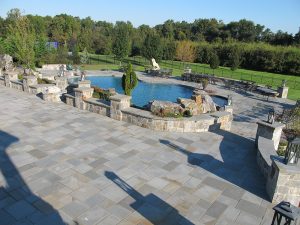
Keeping your pool heated might not seem like the best idea for the summer, but with a heater you can keep it nice and warm even as the weather cools down.
Keeping your pool heated might not seem like the best idea for the summer, but with a heater you can keep it nice and warm even as the weather cools down. Now, you might be wondering, which type of pool heater is right for you? We’ve put together this helpful guide to help you select the heater you would like best for your swimming pool.
Electric Heaters
As the name implies, electric heaters use electricity to generate heat. Currents are run through the resistor, a critical component inside the heater unit itself. The water flows over the resistor, which heats the water up while cooling the resistor down. However, these heaters demand a large, steady supply of electricity in order to function properly. So they’re mainly used for heating small spas and for therapy pools.
Pros of Electric Heaters:
- Affordable
- Do not depend on temperature of surrounding air
Cons of Electric Heaters:
- Installation can be expensive
- Not energy efficient
Gas Heaters
Gas heaters need natural gas or propane as fuel. The gas burns inside what is known as a combustion chamber. The combustion chamber contains copper coils, which are the essential component of these heaters. While the gas is burning, water flows through the coils and heats up. Gas heaters have long been the most popular model of swimming pool heaters. But given the high price of gas and advances in technology, such as the heat pump, the once-soaring popularity of gas heaters is declining.
Pros of Gas Heaters:
- Affordable
- Rapidly heats the water
Cons of Gas Heaters:
- Expected lifespan around five years
- Can create air pollution
Heat Pumps
Like electric heaters, heat pumps also use electricity. However, there are two main types of heat pumps. Air-source heat pumps draw heat from the surrounding air, while water-source heat pumps draw heat from nearby water. Due their tremendous energy-efficiency, heat pumps have become extremely popular as of late.
Pros of Heat Pumps:
- Relatively low operating costs
- Greatly energy-efficient
- The water-source heat pumps do not depend on the air temperature
- Can last anywhere from 10-20 years
- Eco-friendly
Cons of Heat Pumps:
- Very expensive to buy
- Air-source heat pumps do depend on the air temperature
- Heats the water slowly
Solar-Powered Heaters
Solar-powered heaters work in tandem with solar panels to heat up your swimming pool. Sunlight powers the solar panels, which then heat up the water as it is pumped through the panels. Since solar-powered heaters need sunlight to operate, most users will have backup heaters to use at night or when it is cloudy outside.
Pros of Solar-Powered Heaters:
- Low operating costs
- Highly energy-efficient
- Will last anywhere from 15-20 years
- Eco-friendly
Cons of Solar-Powered Heaters:
- Astronomically expensive
- Reliant on the sun; can’t operate during the night, and runs less efficiently in cloudy weather
- Heats water slowly
- Installations on roof or lawn can be unsightly
A SWIMMING POOL FROM HONEYSUCKLE NURSERY AND DESIGN
At Honeysuckle Nursery and Design, you will get construction and maintenance crews on site who have a minimum of 10 years of experience in all types of landscaping. Our designers will work closely with you to understand how you want to use your space so that we can make the most of your entire site. We are committed to providing complete customer satisfaction and will work with you along every step of the way to be sure that you are happy with your landscape design.
Ready to start planning your new professional landscape design? Give us a call at 410-849-5119 or send us an email to schedule your free, no obligation estimate today!
Don’t forget to follow us on Facebook, Twitter, Houzz and YouTube.
